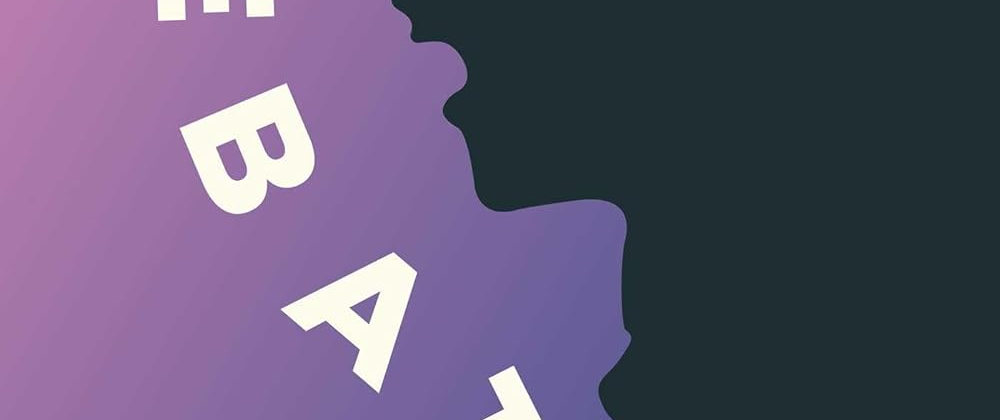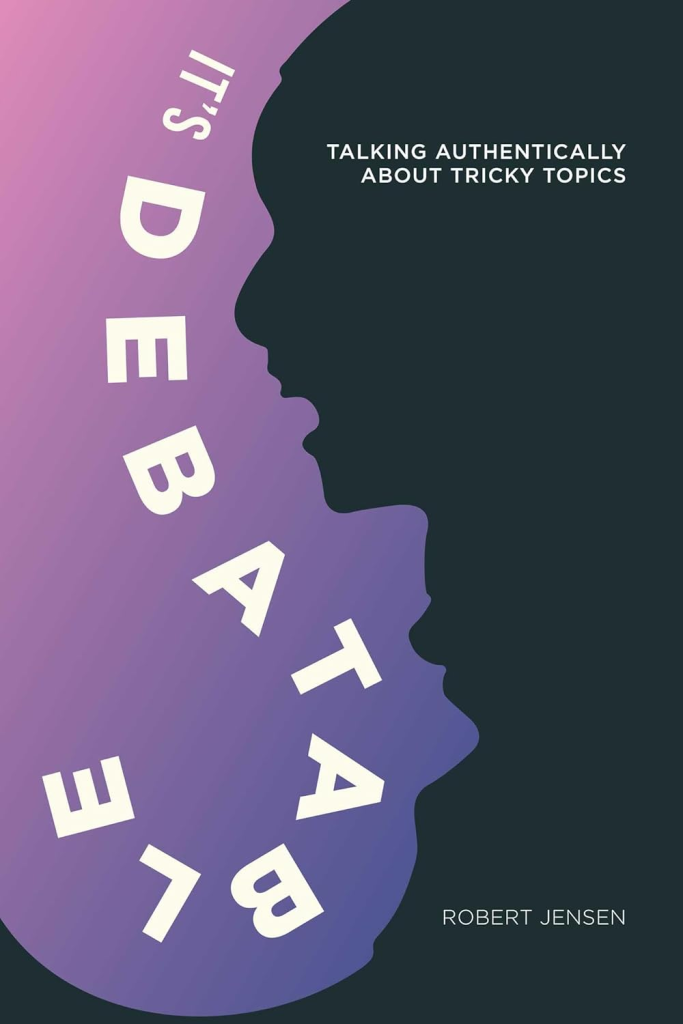

As we conclude Summer Books Week, I am pleased today to interview Robert Jensen about his new book, coming next month! He is Emeritus Professor in the School of Journalism and Media at the University of Texas at Austin. This interview focuses on his new book It’s Debatable: Talking Authentically about Tricky Topics from Olive Branch Press. His previous book, co-written with Wes Jackson, was An Inconvenient Apocalypse: Environmental Collapse, Climate Crisis, and the Fate of Humanity. To subscribe for his mailing list, go here.
I found myself nodding along to your introduction: We are all defined by a “herd mentality.” No one thinks alone. This is, you note, a key point for us to remember when engaging with others, and it is important for a functional democracy. Could you tell us briefly the genesis of this book? When did you realize that this book was particularly necessary now?
I suppose this book is a product of social conflict and aging—it’s a book about a messed-up society written by an old person. It’s a cliché to say that political polarization in the United States has increased in the past decade or two, something almost everyone experiences either online or in person, or both. People report no longer being able to talk across political divides, even in their own families. But as I age—I wrote the book as I was turning 65—I have been increasingly aware of the need for deeper critical self-reflection, and I hope the book reflects that.
I hope that as we get older, we can see more clearly our mistakes—not only bad choices that we have made but also ways that our thinking has been inadequate to the world’s complexity. One consequence of that for me has been realizing that many of the conclusions I had once believed I had come to on my own were the product of social forces, and in some cases biological imperatives. We can’t escape being social animals or being animals.
I know you explain this in the introduction, but could you explain for prospective readers: What do you mean by the phrase “talking authentically” in the book’s title? It seems like “authenticity” is one of those buzz words that is a bit overused at times, yet it is indeed a good thing to be authentic. But what does this mean in particular when talking about topics in our society that are fraught with controversy?
I agree that “authenticity” has been overused, to the point where there’s no guarantee of a common definition. Some people use authentic as a synonym for honesty; if someone asks, “Are you being authentic?” they may just be asking, “Can I trust you to tell me the truth about yourself?” Others use authentic to mean adherence to a tradition; if a cultural ritual is described as authentic, it typically means that it has some connection to past practices, real or imagined. And in the business literature, you can read about the importance of “authenticity in marketing,” without a hint of sarcasm.
In the book, I borrow the term from an activist friend, the late Abe Osheroff, who defined an authentic moment as one in which what we think, what we say, and what we do are all in sync. We are thinking freely, willing to speak to others about what we’ve thought, with the courage to act on what we’ve concluded. Abe pointed out that people are sometimes so nervous about a controversial subject that they might avoid even thinking about it. If they do think about it, they might be hesitant to talk if others around them might disagree. And because acting often comes with risks, they may step back, especially in political struggles.
So, for me, talking authentically means not avoiding contentious subjects and realizing that as citizens we have an obligation to be part of political life. That will mean different things for different people—none of us can be active on every important political issue—but we all can find ways to act constructively, from engaging people in our daily lives to joining social movements to participating in traditional politics.
How did you select the topics for the case study chapters in this book? Why these? Were there other possible topics that you considered as well?
About half the book reflects on the state of contemporary intellectual and political culture, revisits philosophical debates about the nature of knowledge, and offers a framework for understanding free speech. From there, I wanted to take on topics that spark intense debate, which led me to race and racism, the ideology of the transgender movement, and the multiple cascading ecological crises. These are all subjects I’ve thought and written about for decades, and I think I have something sensible to add to the public conversation.
I also chose these three issues because people will disagree with my analyses in ways that are unpredictable. I come from the political left, and my writing on race is generally in line with left ideas. But my critique of trans ideology is very much at odds with dominant left thinking. And my conclusions about the ecological crises and the need collectively to impose limits on population and consumption, well, they don’t get much support on the right or the left. I wanted to write a book that would challenge readers to consider why they might disagree with me.
There is one chapter in the book that your publisher asked you to drop from the final version—on the trans debate. Why is this topic more controversial than the rest? Do you think we have lost all ability as a society to talk about this peacefully?
I agree that there is something disturbing about the debate over transgenderism. I come out of radical feminist politics, specifically the critique of pornography and the sexual-exploitation industries, and many radical feminists have long critiqued trans politics. Agree or disagree with me, I think the argument I make in that chapter—that trans ideology is intellectually incoherent, anti-feminist, and inconsistent with an ecological worldview—is worthy of consideration.
But late in the process, the publisher decided that the chapter was at odds with the values of the press and wouldn’t include it in the book. The press did agree, however, to insert into the book, where that chapter would have been, an explanation for why it was dropped and instructions on how to the find the chapter on my website, where it can be downloaded for free.
In that chapter, I speculate on why so many liberals/leftists have, in little more than a decade, made endorsement of transgender ideology a non-negotiable position, which I think is rooted in uneasiness with the depth of the radical feminist critique of patriarchy. That doesn’t mean, of course, that I think the conservative/right rejection of transgenderism is the result of some newfound embrace of radical feminism.
Individuals have a variety of reasons for accepting or rejecting the policy demands of the trans movement, but I believe the intensity and vitriol of the debate reflect a cultural fear of the often very difficult self-reflection that radical feminism asks of us. I have found that on both the right and left, folks are afraid of such critique, given how deeply that male-dominant ideas and practices are woven into the fabric of everyday life.
What are the bigger questions that continue to fascinate you in your reading, thinking, and writing?
Once again, I think my current interests are a reflection both of what’s going on in the culture and of getting older. There has been a renewed debate about determinism and free will that I find intriguing, and which has challenged the assumptions about human agency that I’ve had for a long time. As I said, this question pops up here and there in this book, though isn’t a central theme.
For some reason, the older I get the easier it is for me to ponder the complex forces that result in what I always thought were “my” decisions. That process includes a lot of thinking about my early childhood experience and how it shaped me. I am more curious than ever about how I became the specific person I am, in a way that I hope isn’t merely self-indulgent. And if we take that question seriously, it seems inevitable that we will not only introspect about ourselves but also try to understand the people in our lives, the culture we live in, and the kind of animal we humans are.
These are questions at the heart of philosophy, the kinds of problems one doesn’t “solve” but keeps pondering. I seem to be pondering them more these days and may try to write another book about it all.